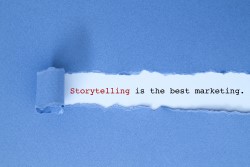How Improving your Storytelling Can Improve your Digital Marketing

Stories are how we as humans connect with the world and the people around us. It is fundamental to our way of life, providing entertainment, instructions, and guideposts for our lives. For marketers, stories are an extremely impactful way to build an emotional connection with our customers. Today, we will be discussing why stories are so effective in marketing, what makes good stories and what stories are important for your business to be telling.
Why Use Stories in Your Marketing?
Storytelling uses the power of empathy to connect with your customers. Empathy allows us to see ourselves in the stories we hear, read, and see, building a bond between ourselves and the story. In marketing, we can use this natural process to build bonds with our company and our products.
Whether we like to believe it or not, all purchases are emotional. B2B or B2C, it does not matter! At the end of the day, emotion, not logic, spurs our desire to buy. The only thing that differs is the reason for the feelings. For example, for B2C customers, the emotion leading you to buy might be for self-improvement, to spark joy, or to bring joy to another. In B2B, the emotion might be to gain the promotion, keep your company alive or improve your daily life. The biggest mistake that B2B companies make is believing that for their products, the purchase decision is tied to logic, and so they avoid storytelling in favor of dry case studies. The key to good storytelling in the business world is to understand the desires and needs of your customers and play into their emotions to build a bond and build trust in your company.
Storytelling Tropes

Tropes are common themes that are often found in stories. I am sure you have heard that there are only seven stories in the world, and every commercial, book, tv show, movie, or play are all variations of the same story. From basic theme to plot details, there is no such thing as a new story. What makes a good story is the emotional engagement we have with the story. The best resource for the complete list of storytelling tropes is The Periodic Table of Storytelling.
The most used trope in marketing is the Hero's Journey. This trope is so successful because it has the customer as the hero in your story and allows you to showcase your product and how they get to where they want to be. This format starts with the problem and allows your company to function as the mentor or guide that helps the hero achieve their goals. Your customers can then see themselves as the hero and build an emotional bond with your company as its trusted advisor.
Key Features of a Good Marketing Story

There are a few key features that should be present in your marketing story to make them more successful:
- The customer is the hero of your story
- Focus on their problem, not your solution
- Make sure that your story shows what is at stake
- There must be action to drive the story
- There must be a reflection section to build empathy
- Your story must utilize hope
- Be clear on what your characters want and their motivation
- Show the deeper meaning; it is what your customers crave
Important Stories for Businesses to Tell
For businesses, it is often hard to determine which stories you should be telling. There are two types of stories: company stories and customers stories. For customers every sell is a story to tell. Think about their struggles and motivations, as well as the solution and the results. Client stories are much more powerful than case studies.
For your business itself, you should always have your origin story and stories for leadership changes, and don't be afraid to share your growing pains. The goal of your company stories is to humanize your company. Your clients connect with people, not companies.
As you are beginning to craft your story moments, don't focus on finding melodrama to tell. Think about what engages you, what makes a good story, and focus on that.
Conclusion
It is the stories that we tell that help our customers connect with our companies. They allow them to relate to the products that we offer on an emotional level. Remember, logic does not sell products; emotions do.
Here it is! You have been expecting it - the sales pitch. As I am sure you have discovered, this blog was created by Lionzone Digital Marketing, which means that we would be more than happy to assist your company with their Digital Marketing needs; for more information about our services, please see https://lionzone.com/digital-marketing. My favorite feature of our services, no long-term contracts! If we don't earn your business every day, we don't deserve to keep you! Lionzone Digital Marketing - we get results!
Resources:
https://lesley.edu/article/the-psychology-of-emotional-and-cognitive-empathy




